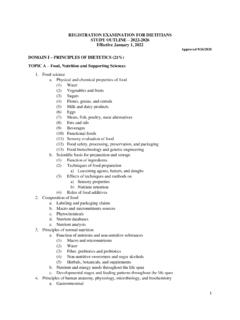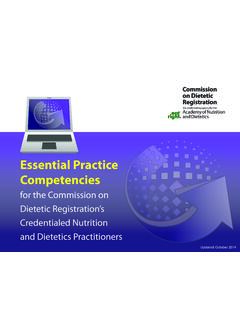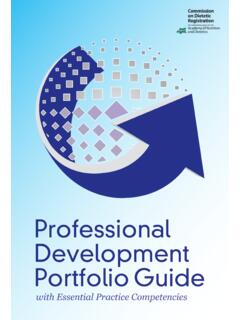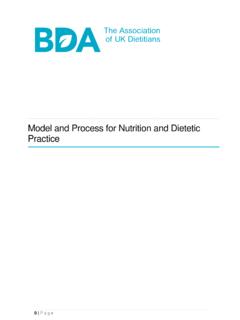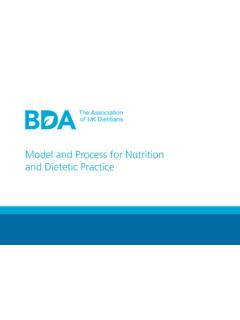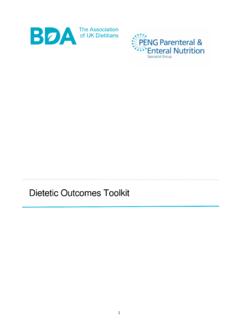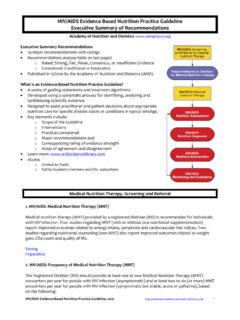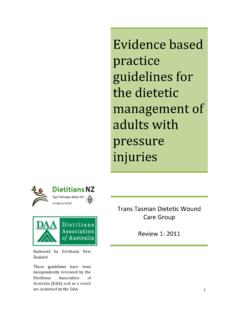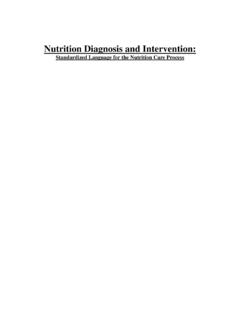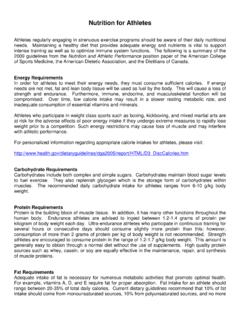Transcription of Essential Practice Competencies
1 Essential Practice Competenciesfor the Commission on dietetic Registration sCredentialed nutrition and Dietetics PractitionersUpdated: March 2021 Essential Practice Competencies for the Commission on dietetic Registration s Credentialed nutrition and Dietetics Practitioners Table of Contents Sphere 1: Ethics ..5 Sphere 2: Communications ..8 Sphere 3: Leadership and Advocacy ..9 Sphere 4: Critical Thinking and Decision Making .. 10 Sphere 5: Informatics .. 11 Sphere 6: Research and Scholarship .. 13 Sphere 7: Quality Management .. 15 Sphere 8: Food, nutrition and Dietetics .. 18 Sphere 9: Education and Counseling .. 21 Sphere 10: Clinical Care .. 23 Sphere 11: Business, Industry and Product Development .. 27 Sphere 12: Community, Population and Global Health .. 30 Sphere 13: Foodservice Systems and Management .. 32 Sphere 14: Organization Management .. 34 Practice Competencies Glossary .. 35 Contents Essential Practice Competencies for the Commission on dietetic Registration s Credentialed nutrition and Dietetics Practitioners The Commission on dietetic Registration has developed the Essential Practice Competencies for CDR Credentialed nutrition and Dietetics Practitioners to provide overarching validated standards for two credentials, the Registered Dietitian (RD) and the dietetic Technician, registered (DTR).
2 Practice Competencies define the knowledge, skill, judgment and attitude requirements throughout a practitioner s career, across Practice , and within focus areas. Competencies provide a structured guide to help identify, evaluate, and develop the behaviors required for continuing competence. Unlike entry-level Competencies , which focus on preparation and evaluation for minimum competence upon completion of an ACEND (Accreditation Council for Education in nutrition and Dietetics) education program and during early years of Practice , the Essential Practice Competencies are intended for use throughout a nutrition and dietetics practitioner s career. Purpose and Application of the Essential Competencies There is an expectation that Competencies will be used by the dietetics profession to: identify learning needs; guide continuing professional development and ongoing competence; assist in career progression and professional development; and to communicate the role and competence of the profession to stakeholders ( employers, external accreditation bodies, the public, etc.)
3 The Competencies are broad in nature and foundational to both RD and DTR Practice . However, the relevance of the Essential Competencies depends on the individual practitioner s role and responsibilities. It may notbe possible or necessary for the individual to apply certain Competencies in a specific Practice context. The Essential Competencies and relevant performance indicators are applied and interpreted in light of the requirements of the individual s context and particular situation. The relevance of a performance indicator will depend on the client, Practice setting, situation, and role. The depth and breadth of the application of the Competencies also differentiates between the RD and DTR. Four factors impact this: the client, the Practice setting, the situation, and an individual s educational preparation. The Competencies apply differently depending upon the complexity of the situation, the client s condition, and the type of the environment in which the activity is performed.
4 The performance indicators or behaviors associated with the competency will be different when applied in different situations. For example, some practitioners may participate in research projects, but others may lead a research initiative. RDs independently conduct nutrition assessment to evaluate an individual s health, malnutrition and disease, whereas DTRs perform aspects of nutrition screening under the supervision of an RD to support the RD s comprehensive assessment. The more complex the client and/or situation, and the more dynamic the environment, the greater the level of competence required. 2019 2020 Project Process Development and validation of the Essential Practice Competencies involved seven key steps: 1. literature review and global environmental scan of nutrition and dietetics Competencies ; 2. Competencies writing sessions; 3. stakeholder consultations; 4. national validation study of the Essential Practice Competencies by CDR s credentialed nutrition and dietetics practitioners; 5.
5 Finalization and CDR approval. Introduction Essential Practice Competencies for the Commission on dietetic Registration s Credentialed nutrition and Dietetics Practitioners Essential Practice Competencies There are 14 spheres, 65 Practice Competencies for RDs (64 for DTRs), and 418 performance indicators for RDs (374 performance indicators for DTRs).These Essential Practice Competencies are: Broad enough to encompass the range of activities within theprofession( , clinical care, management, food services, research,education, etc.), and to recognize that RDNs and NDTRs assume manyunique roles ( , marketing for a food manufacturer, informatics for ahealth system, etc.). Descriptive of the different Practice roles between the RDN and NDTR credentials. Applicable to all credentialed nutrition and dietetics practitionersCore Essential Practice Competencies The core Essential Practice Competencies describe the knowledge, skills, judgment and attitudes that apply to all credentialed practitioners regardless of role, area of Practice , or setting.
6 Sphere 1: Ethics Sphere 2: Communications Sphere 3: Leadership and Advocacy Sphere 4: Critical Thinking and Decision Making Sphere 5: Informatics Sphere 6: Research and Scholarship Sphere 7: Quality Management Sphere 8: Food, nutrition and Dietetics Sphere 9: Education and Counseling Functional Essential Practice Competencies The functional Essential Practice Competencies describe the role-specific knowledge, skills, judgment and attitudes needed for a particular Practice focus. Sphere 10: Clinical Care Sphere 11: Business, Industry and Product Development and Marketing Sphere 12: Community, Population and Global Health Sphere 13: Foodservice Systems Management Sphere 14: Organization Management Stakeholder Consultation Throughout the development process, CDR sought feedback from various Academy of nutrition and Dietetics organizational units ( , BOD, ACEND, HOD, QM, CFP, MIGs, DPGs, and Affiliates) to ensure that the final Competencies reflected current Practice .
7 Introduction Essential Practice Competencies for the Commission on dietetic Registration s Credentialed nutrition and Dietetics Practitioners National Validation Study - 2020 A national validation study was conducted to validate the relevance of the Competencies and performance indicators, and to assess their importance in Practice . The survey was developed and circulated to 65,441 credentialed RDs and DTRs. 2,114 RDNs and 160 NDTRs logged into the survey, where they obtained general information on the Competencies and their intended purpose. Overall, the collected data confirmed that the Competencies developed are relevant and important to current Practice . Survey participant comments were used to further refine the wording of the Spheres, Competencies , and Performance Indicators, and to expand the list of Practice Illustrations (examples of how the Competencies are demonstrated in Practice ). Acknowledgements The Essential Practice Competencies for CDR Credentialed nutrition and Dietetics Practitioners was made possible through the collaboration of the Commission on dietetic Registration s Competency Assurance Panel, and representatives from the Academy of nutrition and Dietetics Quality Management Committee.
8 The working group, consisting of dedicated RDs and DTRs and representing a wide variety of geographical and Practice perspectives, provided the leadership and content expertise for this project. Competency Assurance Panel and Quality Management Working Group (2019 2020) Karen Lacey, MS, RD, CD, FAND Chair Amanda R Coufal, BS, NDTR Linda Heller, MS, RD,CSP,CLC, FAND Megan Sexton, MSD, RDN, LD Becky Sulik, RDN, CDE, LD Riva Touger-Decker, PhD, RD, FADA Amanda Kruse, MS, RD, LD, FAND David Travis Thomas, PhD, RDN, CSSD, LD, FAND Special thanks for consultation in developing the Essential Competencies are extended to, the members of the Accreditation Council for Education in nutrition and Dietetics(ACEND), Council on Future Practice , Quality Management Committee, the Commission on dietetic Registration Commissioners, and members of the Dietetics in Health Care Communities DPG, Clinical nutrition Management DPG, and dietetic Technicians in Practice DPG. Introduction 5 Essential Practice Competencies for the Commission on dietetic Registration s Credentialed nutrition and Dietetics Practitioners Sphere 1 Ethics Identifies with and adheres to the code of ethics for the profession.
9 RDNs and NDTRs Competencies and Performance Indicators Demonstrates and maintains competence in Practice . Participates and documents engagement in professional development activities to maintain and enhance competence. Pursues and embraces opportunities to advance Practice . Keeps abreast of changes in Practice and in the Practice environment that affect individual competence and legislative scope of Practice . Continuously develops and enhances expertise by seeking feedback and self-assessing competence. Integrates new knowledge and skills into Practice . Recognizes and exercises professional judgment within the limits of individual qualifications. Builds collaborative relationships to encourage professional growth and development. Collaborates with others, seeks counsel and makes referrals as needed. Demonstrates integrity in personal and organizational behaviors and practices . Recognizes and discloses any conflicts of interest, including any financial interests in products or services.
10 Keeps abreast of and complies with national, state, and local legislation, regulations, policies and standards. Models organizational mission and vision statements, principles and values. Maintains and appropriately uses credentials and certifications. Respects intellectual property rights, including citations and recognition of the ideas and work of others. Provides accurate and truthful information in all communications. Reports inappropriate, unethical or incompetent behavior or treatment of others. Documents, codes and bills to most accurately reflect the character and extent of delivered services. Prioritizes goals in order to effectively manage time and workload. Recognizes and manages situations with ethical implications. Recognizes actual or potential ethical issues and dilemmas encountered in Practice . Uses an ethical framework to guide decisions. Uses ethical reasoning and decision-making processes to address ethical dilemmas.
